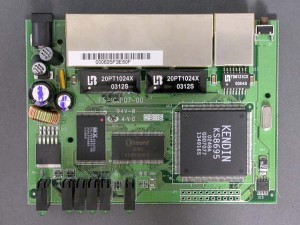In this article we’ll see how we can use Dmidecode command to retrieve hardware information of any Linux system. Suppose if we want to upgrade a system we need to gather information like Memory, BIOS and CPUetc. With help of Dmidecode command we will come to know the details without opening system chasis. Dmidecode command works for RHEL/CentOS/Fedora/Ubuntu Linux.

How to Get Hardware Information in Linux
Dmidecode tool read
DMI (some say
SMBIOS) table to fetch data and displays useful system informations like
hardware details,
serial numbers and
BIOS version,
Processor etc. in human readable format. You may require root priviledge to execute dmidecode command.
1. Basic Output of Demidecode
Below is the Demidecode command sample output.
# dmidecode 2.11
SMBIOS version fixup (2.31 -> 2.3).
SMBIOS 2.3 present.
45 structures occupying 1642 bytes.
Table at 0x000E0010.
Handle 0x0000, DMI type 0, 20 bytes
BIOS Information
Vendor: Phoenix Technologies LTD
Version: 6.00
Release Date: 12/06/2006
Address: 0xE78A0
Runtime Size: 100192 bytes
ROM Size: 64 kB
Characteristics:
ISA is supported
PCI is supported
PC Card (PCMCIA) is supported
PNP is supported
APM is supported
BIOS is upgradeable
BIOS shadowing is allowed
ESCD support is available
USB legacy is supported
Smart battery is supported
BIOS boot specification is supported
2. How to Get DMI Types
DMI Id give us particular hardware information of system. Dmidecode with options ‘-t ‘or ‘–type‘ and ‘Id‘ will provide us the exact infromation. Id 6 will give us Memory Module information.
[root@tecmint ~]# dmidecode -t 6
# dmidecode 2.11
SMBIOS version fixup (2.31 -> 2.3).
SMBIOS 2.3 present.
Handle 0x0009, DMI type 6, 12 bytes
Memory Module Information
Socket Designation: RAM socket #0
Bank Connections: 0 1
Current Speed: Unknown
Type: EDO DIMM
Installed Size: 1024 MB (Single-bank Connection)
Enabled Size: 1024 MB (Single-bank Connection)
Error Status: OK
Handle 0x000A, DMI type 6, 12 bytes
Memory Module Information
Socket Designation: RAM socket #1
Bank Connections: 2 3
Current Speed: Unknown
Type: EDO DIMM
Installed Size: Not Installed
Enabled Size: Not Installed
Error Status: OK
Handle 0x000B, DMI type 6, 12 bytes
Memory Module Information
Socket Designation: RAM socket #2
Bank Connections: 4 5
Current Speed: Unknown
Type: EDO DIMM
Installed Size: Not Installed
Enabled Size: Not Installed
Error Status: OK
Handle 0x000C, DMI type 6, 12 bytes
Memory Module Information
Socket Designation: RAM socket #3
Bank Connections: 6 7
Current Speed: Unknown
Type: EDO DIMM
Installed Size: Not Installed
Enabled Size: Not Installed
Error Status: OK
Following are the DMI types details.
Type Information
----------------------------------------
0 BIOS
1 System
2 Base Board
3 Chassis
4 Processor
5 Memory Controller
6 Memory Module
7 Cache
8 Port Connector
9 System Slots
10 On Board Devices
11 OEM Strings
12 System Configuration Options
13 BIOS Language
14 Group Associations
15 System Event Log
16 Physical Memory Array
17 Memory Device
18 32-bit Memory Error
19 Memory Array Mapped Address
20 Memory Device Mapped Address
21 Built-in Pointing Device
22 Portable Battery
23 System Reset
24 Hardware Security
25 System Power Controls
26 Voltage Probe
27 Cooling Device
28 Temperature Probe
29 Electrical Current Probe
30 Out-of-band Remote Access
31 Boot Integrity Services
32 System Boot
33 64-bit Memory Error
34 Management Device
35 Management Device Component
36 Management Device Threshold Data
37 Memory Channel
38 IPMI Device
39 Power Supply
Instead of going with ‘type_id‘ you can also use keyword with ‘-t‘ argument to the dmidecode command. Following are the list of available keywords.
Keyword Types
------------------------------
bios 0, 13
system 1, 12, 15, 23, 32
baseboard 2, 10
chassis 3
processor 4
memory 5, 6, 16, 17
cache 7
connector 8
slot 9
For example, to get the Cache information on system, you can execute below command instead of Id 7.
[root@tecmint ~]# dmidecode -t cache
# dmidecode 2.11
SMBIOS version fixup (2.31 -> 2.3).
SMBIOS 2.3 present.
Handle 0x000D, DMI type 7, 19 bytes
Cache Information
Socket Designation: L1 Cache
Configuration: Enabled, Socketed, Level 1
Operational Mode: Write Back
Location: Internal
Installed Size: 16 kB
Maximum Size: 16 kB
Supported SRAM Types:
Burst
Pipeline Burst
Asynchronous
Installed SRAM Type: Asynchronous
Speed: Unknown
Error Correction Type: Unknown
System Type: Unknown
Associativity: Unknown
Handle 0x000E, DMI type 7, 19 bytes
Cache Information
Socket Designation: L2 Cache
Configuration: Enabled, Socketed, Level 2
Operational Mode: Write Back
Location: External
Installed Size: 0 kB
Maximum Size: 512 kB
Supported SRAM Types:
Burst
Pipeline Burst
Asynchronous
Installed SRAM Type: None
Speed: Unknown
Error Correction Type: Unknown
System Type: Unknown
Associativity: Unknown
3. How to Get Memory Information
How do i get Memory information on system and how much memory is supported by system? The following command shows that the system can support maximum 4GB of RAM.
▬▬▬▬▬▬▬▬▬▬▬▬▬▬▬▬▬▬▬▬▬▬▬▬▬▬▬▬▬
▬▬▬▬▬▬▬▬▬▬▬▬▬▬▬▬▬▬▬▬▬▬▬▬▬▬▬▬▬

No comments:
Post a Comment